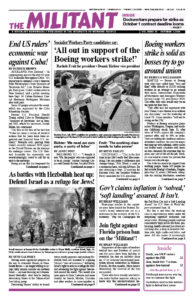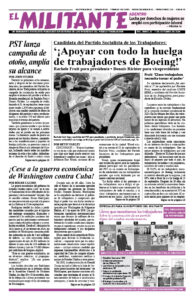October 11, 1999
Hurricane Floyd has brought disaster in its wake for tens of thousands of working people from North Carolina to New Jersey. At least 50 people have died, and 20,000 have been driven from their homes in the worst-hit state, North Carolina.
Capitalist relations shape the differential impact of the floods. The wealthier farmers who employ wage labor tend to live on higher ground. They are the major recipients of government assistance. Workers, farmers and their families, along with proprietors of small enterprises, bear the brunt of the flooding. Their farms, homes, schools and jobs are destroyed or jeopardized.
Workers and working farmers must stand together to demand immediate and massive cash relief for those affected by the flood. We should also demand: Stop all farm foreclosures — not one working farmer should lose one acre of land.
October 11, 1974
On Sept. 30 Gen. Antonio de Spinola resigned as president of Portugal after being forced by mass pressure to call off a major right-wing mobilization scheduled for Sept. 28 in Lisbon.
Buses were to have brought participants from sections of the country. However, the bus drivers union responded by stopping all buses into Lisbon. Teams of workers, students, and supporters of the Communist, Socialist and other political groups stationed themselves around the city to stop any armed rightists from entering.
If the capitalist rulers become sufficiently alarmed over the possibility of mass actions getting out of their control, there is a real danger of a rightist coup. Such a defeat could only be prevented by a broad mobilization of the masses, led by a revolutionary party aiming at establishing a government of the workers and peasants.
October 10, 1949
Goaded beyond endurance by the arrogant steel monopolists who are demanding nothing less than unconditional surrender, more than 500,000 workers in basic steel have chosen the only honorable course left open to them — strike action.
Including 380,000 soft coal miners who left the pits three weeks ago, American workers now on strike total nearly a million. Thus, the battle of steel involves not merely the immediate issue — contributory or noncontributory pensions — but a test of strength to determine whether or not the steel workers union shall continue to endure.
Government intervention remains the deadliest threat to the strike. [President] Truman can do this through the Taft-Hartley Act, which he has not hesitated to use in the past. Let the slogan of the labor movement be: “The monopolists asked for it — now let ’em have it!”

